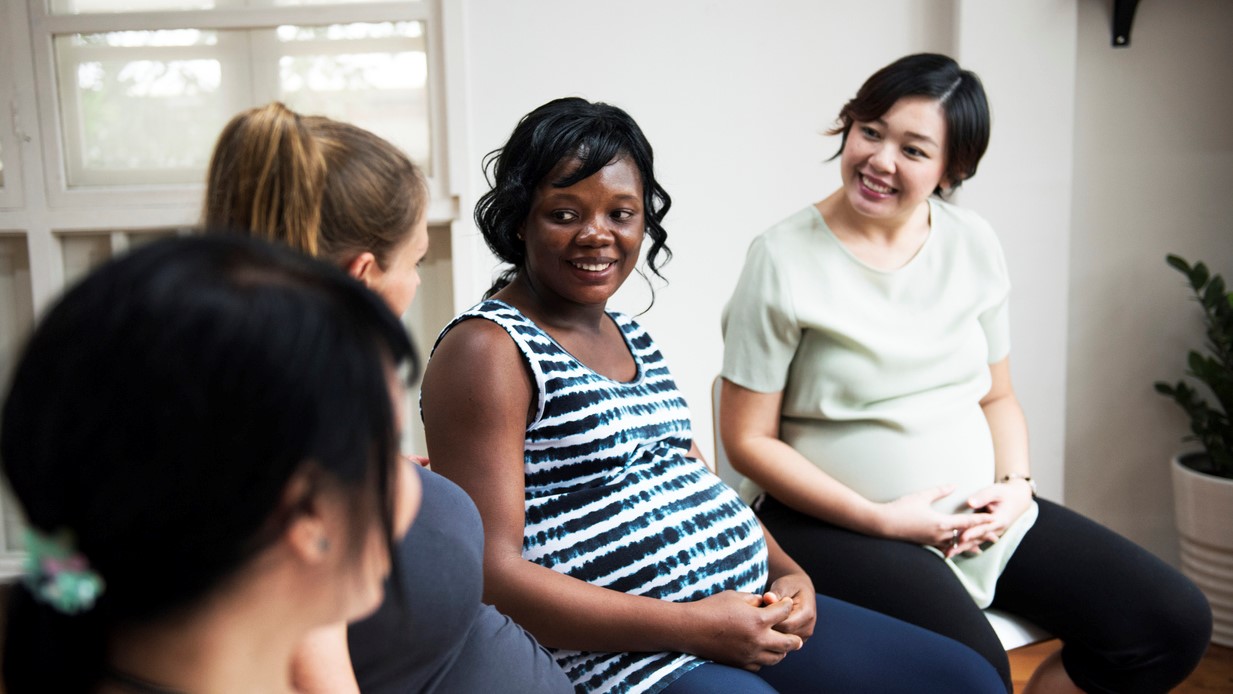Five benefits of group prenatal care with OHSU’s nurse-midwives

At the OHSU Center for Women’s Health, nurse-midwife Rebecca Soderlind Rice, D.N.P., CNM, FNP, is leading a discussion about the early stages of labor. A group of pregnant people – many with their partners – listen and ask questions attentively. After all, pregnancy and birth are a new experience for most of them, and they know labor doesn’t always happen like it does in the movies.
The conversation is one of seven sessions in the group prenatal care program offered by OHSU’s nurse-midwives. The two-hour sessions happen monthly, then biweekly, from about 20 weeks through 36 weeks gestation. In this model, members gather for education and discussion as a group, as well as for individual check-ins with the midwife.
We asked Soderlind Rice why group prenatal care is so popular, and she shared five great benefits of the program.
- You’ll spend much more time with a midwife.
An individual prenatal care visit lasts 20 minutes, but a group prenatal care visit lasts two hours.
“There’s time structured out for individual appointments, where you get one-on-one time with the midwife,” says Soderlind Rice. “But, you also get this one-hour-plus session on a variety of pregnancy, birth and postpartum topics.” Group prenatal care gives expecting parents the opportunity to hear from others and learn more about pregnancy and childbirth with each session.
- It’s still a medical visit.
While education and discussion are an important part of the program, medical care with a midwife is, too. During the one-on-one time, midwives take vital signs and measurements, listen to the baby’s heart tones, and answer any questions people would prefer not to cover with the group. If there are any concerns, such as high blood pressure or pre-term contractions, those are addressed just like during a regular medical visit.
- Empowerment through community.
Maybe you’re new to Portland or maybe you just don’t have many friends who are building their families right now. Through group prenatal care, you’ll meet people who are going through the same thing at the same time.
“The community that you get in group prenatal care is one of the most enduring things that patients talk about and appreciate,” says Soderlind Rice. “Parents build lasting relationships even after their babies are born.”
- You’ll get more information, including what you didn’t think to ask about.
Each of the seven sessions has a topic, and there’s plenty of time to dive deep on each one. For example, a session is devoted to each stage of labor, while other sessions focus on breastfeeding or post-partum healing and expectations.
“You get to be with other parents and their support person and talk about your diverse experiences,” says Soderlind Rice. “Sometimes parents have other births they have been through and they can also share those experiences.
“There really is a sense of conversation and shared ownership,” adds Soderlind Rice. “It's not a lecture, it's a conversation.”
- It works. Group prenatal care participants have better birth outcomes.
The OHSU nurse-midwives have studied the group approach and the difference it makes. Research shows that people who choose group care are more dilated when they arrive at labor and delivery and spend less time at the hospital, overall. They also have lower rates of C-sections or birth interventions.
“Patients report increased satisfaction with group prenatal care,” says Soderlind Rice, who adds that attendance is also shown to be higher in group settings.
While each pregnancy and birth story is different, group prenatal care creates a community that goes through the life-changing experience together.